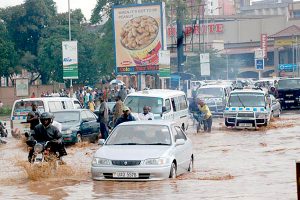
Its 5 am in the morning, Moses Dombo, a Public Affairs Officer at Parliament of Uganda is getting ready for the day’s work. As he presses his shirt buttons, suddenly the skies let loose and the rains pound the roof.
“This is unbelievable,” he says. Not only does the rain triple the number of cars on the road causing an unbearable traffic jam, but it also floods Kampala due to the poor drainage channels.
The fighter that he is, Dombo who lives in Mukono fires his Toyota Prado engines and heads to Kampala but after almost one hour and a half, he reaches the Namboole flyover where he learns that heavy floods have cut off the Jinja Road at Kyambogo.
When he switches on the radio, he learns that the story is the same in Bugolobi, Shoprite, Clock Tower, Entebbe road among other access roads. For the man who left his home at 5 am, Dombo finally gets to the office at 11 am – frustrated to the marrow but luckily for him, he is among the first to arrive.
Dombo’s frustration does not come near that of public passengers who use taxis and boda-bodas to get to their workplaces.
“One day I took a boda to get to work and people asked me if I was coming from the garden. I had mud all over me, I was dripping wet, cold and honestly felt sick,” recalls Irene Kyomugisha, who works with the Audit firm, Ernest and Young.
Kyomugisha who says she is now used acknowledges that there are other people who get to the point of changing places due to flood-related challenges.
The Bwaise story
Finding the water on the road is one story but the water finding you in your bed is a disaster only slum dwellers in Bwaise, Kawempe and other areas can narrate.
Lying above the northern by-pass drainage channel, there is nothing more detested in Bwaise than a cloud forming in the sky.
Children sit upon the decker beds as they watch their clothes, utensils and other household items floating away. When it catches them by surprise during the night, they use basins, saucepans to empty the houses so as to get a little sleep – at least until the sun comes out.
“I have lived in this place for one decade now and this is how the situation has been like despite pledges by authorities to improve the situation. It becomes worse when water spills in the house, leaving us stranded the whole night,” says Shadia Nantumbwe.
Other city suburbs that are prone to flooding are Kasubi, Katanga, Kisenyi, Nalukolongo, Kabuusu, Katwe, Namungoona, and Kinawataka among others.
Who is to blame? Not God of course! The flooding of Kampala according to experts is purely man-made.
“They tell you not to build in a wetland, you go ahead and build. They say don’t throw plastics in non-designated areas, you throw soda and water bottles wherever and they block drainage channels, what do you expect in return,” Nickson Katusiime, a lecturer at Uganda Christian University told Matooke Republic.
The Kampala Capital City Authority (KCCA) itself seems overpowered by the growing construction of new buildings and factories in water belts and drainage channels.
According to Dr Najib Lukooya Bateganya, the KCCA director for environment and sanitation, Ugandans have failed to comply with the Authority’s regulations and this has partly escalated the flooding problem in the city.
“Currently, many factories and houses have been built in wetlands despite the existing law because some developers wield much influence and are connected to the powers that be,” he said.
Bateganya agreed with Kembabazi that the public has always let down KCCA in its bid to fight flooding because they dump waste in the drainages, which triggers backflow of water.
“That has been our biggest challenge as authorities because the public hasn’t complied with regulations. For instance, when you walk around, you will see plastics and other waste dumped in drainages, which is very absurd,” he added.
It is however not true that Kampalans hate rain –maybe just not all the time. For when the skies are mean and the dust sets in, one does not need to look far to hear the public outcry.
What is missing perhaps is better drainage systems, good waste management, plastic recycling, and a strict adherence to the law to ensure that no one builds in gazetted areas.